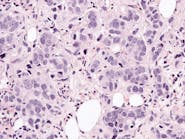The vast majority of American adults eat a dietary pattern that falls short of meeting national dietary guidelines for cancer prevention, a new study from Ohio State University shows, according to a news release.
When researchers analyzed the dietary intake of more than 30,000 American adults according to body mass index (BMI), the results also showed that people with BMIs in the obese range were the least likely to adhere to the dietary recommendations intended to reduce the risk for cancer.
The analysis measured self-reported dietary recalls and diet quality. Though the percentages of American adults who met each food source category differed, between almost 63% and 73% fell short of the recommended daily intake of fruits and vegetables and whole grains, and roughly 90% failed to meet the 30 grams of fiber per day recommendation.
The cancer-prevention guidelines updated by the American Institute for Cancer Research (AICR) in 2018 and the American Cancer Society nutrition and physical activity guideline closely mirror the 2020-2025 Dietary Guidelines for Americans recommended by the U.S. Department of Agriculture, suggesting that most U.S. adults are eating a suboptimal dietary pattern when it comes to nutrition-related disease prevention.
“We’re looking at individuals to move toward a primarily plant-based type of dietary pattern rich in fruits and vegetables, whole grains and beans, peas, lentils, seeds and nuts, and cutting back on saturated fats and sodium,” said senior study author Colleen Spees, Associate Professor of Medical Dietetics in the School of Health and Rehabilitation Sciences at The Ohio State University. “Modifying our current dietary and physical activity patterns to better align with these evidence-based guideline."





